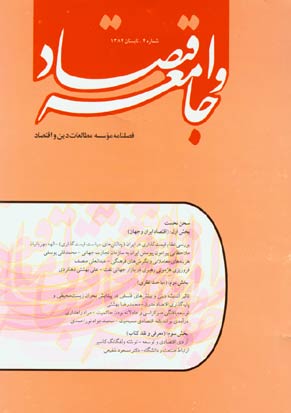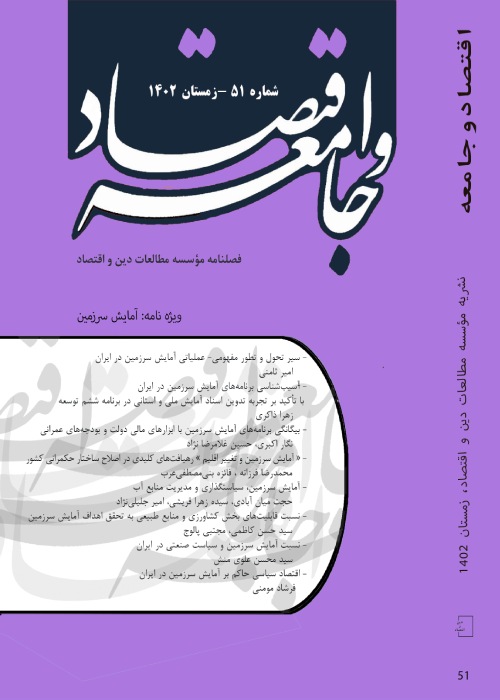فهرست مطالب

نشریه اقتصاد و جامعه
پیاپی 4 (تابستان 1384)
- 200 صفحه، بهای روی جلد: 12,000ريال
- تاریخ انتشار: 1384/07/30
- تعداد عناوین: 9
- بخش اول: اقتصاد ایران و جهان
-
صفحه 8قیمت یکی از عوامل اصلی در ایجاد انگیزه برای فعالیت های اقتصادی محسوب شده و سیاست قیمت گذاری یا کنترل قیمت ها از جمله مباحث مورد توجه در اقتصاد کشورهای توسعه یافته و در حال توسعه می باشد. در ایران تا پیش از دهه 1360 هدف از کنترل قیمت محصولات کشاورزی مبارزه با افزایش قیمت ها بود لیکن از سال 1368 با تصویب قانون تضمین خرید محصولات اساسی زراعی و تصویب قانون اصلاحیه آن در سال 1373 برای خرید محصولات باغی و دامی، سیاست قیمت گذاری با هدف افزایش تولید به منظور کاهش واردات مطرح شد...
-
صفحه 30الحاق به سازمان تجارت جهانی به ویژه برای کشورهای در حال توسعه در صورت برنامه ریزی درست می تواند یک فرصت تلقی شود. پذیرش ایران به عنوان عضو ناظر این سازمان ضرورت اصلاح ساختار نهادی و قانونی و همچنین شفاف سازی عرصه های مختلف را ضروری می سازد. در این مقاله ضمن بررسی موضوعات مورد مذاکره، تنگناها و فرصت های ناشی از الحاق مورد بررسی قرار می گیرد. در پایان راه کارهای لازم جهت آگاهی مقامات اجرایی به مسائل مطرح و حساسیت مذاکرات ارائه می گردد.
-
صفحه 58امروزه کاهش هزینه های معاملاتی به عنوان یک متغیر موثر بر توسعه فعالیت های اقتصادی تلقی می گردد. در این مقاله در چارچوب تحلیل نهادگرایان جدید به بررسی این موضوع می پردازیم که علاوه بر متغیر توسعه فناوری، چه متغیرهای دیگری بر هزینه های معاملاتی موثرند. از طریق این تحلیل اولا؛ به این نتیجه می رسیم که اصول و قواعدی که فرهنگ یک جامعه تصریح می کند به عنوان یکی از متغیرهای کلیدی تاثیر گذار بر هزینه های معاملاتی است. ثانیا؛ در چارچوب تحلیل نهادگرایان جدید و تحلیل های خرد اقتصادی به این نتیجه می رسیم که در صورتی فرهنگ یک جامعه می تواند به کاهش این هزینه ها کمک کند که اصول و قواعد آن بر فرد گرایی بشر دوستانه تاکید نماید.
-
صفحه 72یکی از رخدادهای مهم بازار نفت شوک هایی است که این بازار را تحت تاثیر قرار داده است. بروز این شوک ها منتهی به تشکیل نهادهای بین المللی جدیدی مانند آژانس بین المللی انرژی در کنار اوپک گردیده است. در این مقاله تلاش شده است با توجه به عرضه و تقاضای نفت در جهان، نقش رهبری این بازار در شرایط جدید مورد برسی قرار گیرد. در این مقاله نقش، قدرت و جایگاه تولید کنندگان و صادر کنندگان مطرح شده و ضرورت تعریف و تبیین تعاملات و ساماندهی نوین و منطبق با شرایط جدید مورد تاکید قرار گرفته است.
- بخش دوم: مباحث نظری
-
صفحه 94امروزه با شکل گیری مباحث جدید در فلسفه، سمت و سوی مباحث آن شده که نگرش های فلسفی و فرهنگی تا چه اندازه در شکل گیری رفتارهای انسان ها و نیز علوم نوین اثر گذار بوده است. در دنیای مدرن به اعتقاد بسیاری از فیلسوفان، سخن گفتن از شکل گیری علوم اجتماعی بدون لحاظ کردن اندیشه های فلسفی و فرهنگی تقریبا غیر ممکن است و فلسفه به عنوان پیش زمینه فکری برای پایه گذاری این علوم محسوب می شود. در این مقاله تلاش شده است تا تاثیر اندیشه دینی به عنوان بخشی از نگاه فرهنگی و نیز بینش های فلسفی در پیدایش بحران زیست محیطی و همچنین پایه گذاری اقتصاد مدرن به عنوان تبیین کننده رفتارهای اقتصادی و اجتماعی انسان ها به بحث گذاشته شود.
-
صفحه 102امروزه یکی از مباحث مهمی که ذهن بسیاری از اقتصاددانان را به خود مشغول داشته، نسبت دموکراسی با علم اقتصاد می باشد. نگاه به سیر تکامل نظریات اقتصاد توسعه نشان می دهد که اهمیت عدالت اجتماعی به عنوان یکی از کلیدی ترین متغیرهای برخی مکاتب و نظام های اقتصادی، بسیار پررنگ شده و بحث مهم عدالت در کنار دموکراسی به عنوان یکی از پایه های توسعه اقتصادی دیده می شود. نویسنده مقاله تلاش نموده است که نسبت توسعه یافتگی دموکراسی و عادلانه بودن حاکمیت را به بحث و بررسی بگذارد.
-
صفحه 146یکی از اشکال اقتصاد دینی، اقتصاد مسیحی است که ادبیات آن از دهه 1970 آغاز و از آن زمان تا کنون شاهد توسعه فراوانی بوده است. در این مقاله این موضوع مورد بررسی قرار می گیرد که آیا کتاب مقدس درباره مسائل اقتصادی مطالبی را بیان کرده است یا خیر؟ در ادامه تفکر مربوط به نهضت اصلاح دینی مورد بررسی قرار می گیرد. تعریف و بیان ماهیت اقتصادی مسیحی بخش پایانی این مقاله را تشکیل می دهد.
- بخش سوم: معرفی و نقد کتاب
-
صفحه 180
-
صفحه 186
-
Page 8Price is seen as an essential factor in creating incentive for economic activities and pricing policy, or control of prices, is an issue for discussion in the economies of developed and developing countries. Prior to the 80s, the aim of the control of agricultural products’ prices in Iran was to curb their rise. Later, however, in 1990 the law passed to guarantee the purchase of agricultural products by the State along with its amendment in 1995, to cover horticultural and meat products, aimed at increasing the production and curbing imports. The question is; has that pricing policy succeeded in achieving its objectives and which sector of the producers benefit from such a supportive policy
-
Page 30If planned well, joining the World Trade Organization, particularly for the developing countries, could be seen as an opportunity. Recognition of Iran as an observing member of WTO entails lawful and structural reforms as well as transparency in various domains of the country. While this paper examines the relevant issues debated, it will also discuss bottlenecks and opportunities for Iran in joining WTO. In conclusion, practical ways of dealing with relevant issues are proposed by the paper.
-
Page 58Nowadays, ‘transactional expenditures’ are regarded as an effective variable in the development of economic activities. The issue is discussed in this paper, within the frame of ‘new fundamental analysis’, in which, apart from debating the variable of ‘development of technology’, other variables influencing ‘transactional expenditures’ will be addressed. Through such an analysis it will be firstly deduced that; the principles and rules of the culture of a society act as a key variable in influencing ‘transactional expenditures’ and secondly, that; the culture of a society can help curb such ‘expenditures’ if its principles and rules stress on ‘humane individualism’.
-
Page 72Shocks in oil markets is one of the most important events at these markets which influence them greatly. These shocks have lead to establishing new international organizations such as International Agency of Energy which operates similur to OPEC. In this essay, Considering oil supply and demand of the world, the role of leadership of the oil market is examined. In addition the neccesity for defining and clarification of relations as well as their modern organizing according to new condition is emphasized.
-
Page 94Nowadays, new philosophical topics are concentrating on exploring the influence of theoretical and cultural views in shaping up behavioral patterns of man and in the development of modern sciences. Many philosophers believe that talking about shaping up of social sciences in the modern world without relevant philosophical and cultural concepts is almost impossible. In other word, philosophy is the conceptual prerequisite for the creation of such sciences. This paper is an attempt to explore the role of religious thoughts, as a cultural factor, and also philosophical notions in the emergence of environmental crisis and in the establishment of modern economy as the embodiment of socio-economic behaviors of mankind.
-
Page 102An important issue of the day that has captivated the thoughts of many economists is the correlation between ‘democracy’ and the science of ‘economy’. On the other hand, the trend of evolution in the economic theories of development shows that the significance of the concept of social justice, as a key variable in some economic schools and systems, has gained great momentum. In fact, ‘justice’ is being seen as a pillar of economic development. This paper is an attempt to discuss the correlation between developed democracy and a just State.
-
Page 146Christian economy is a form of religious economy whose literature began emerging in the 1970s and has been developing significantly ever since. This paper examines whether or not the Bible contains economic concepts. Then the notion behind the movement to reform religious percepts is debated in the paper. The concluding part of the paper deals with the definition and nature of Christian economy


